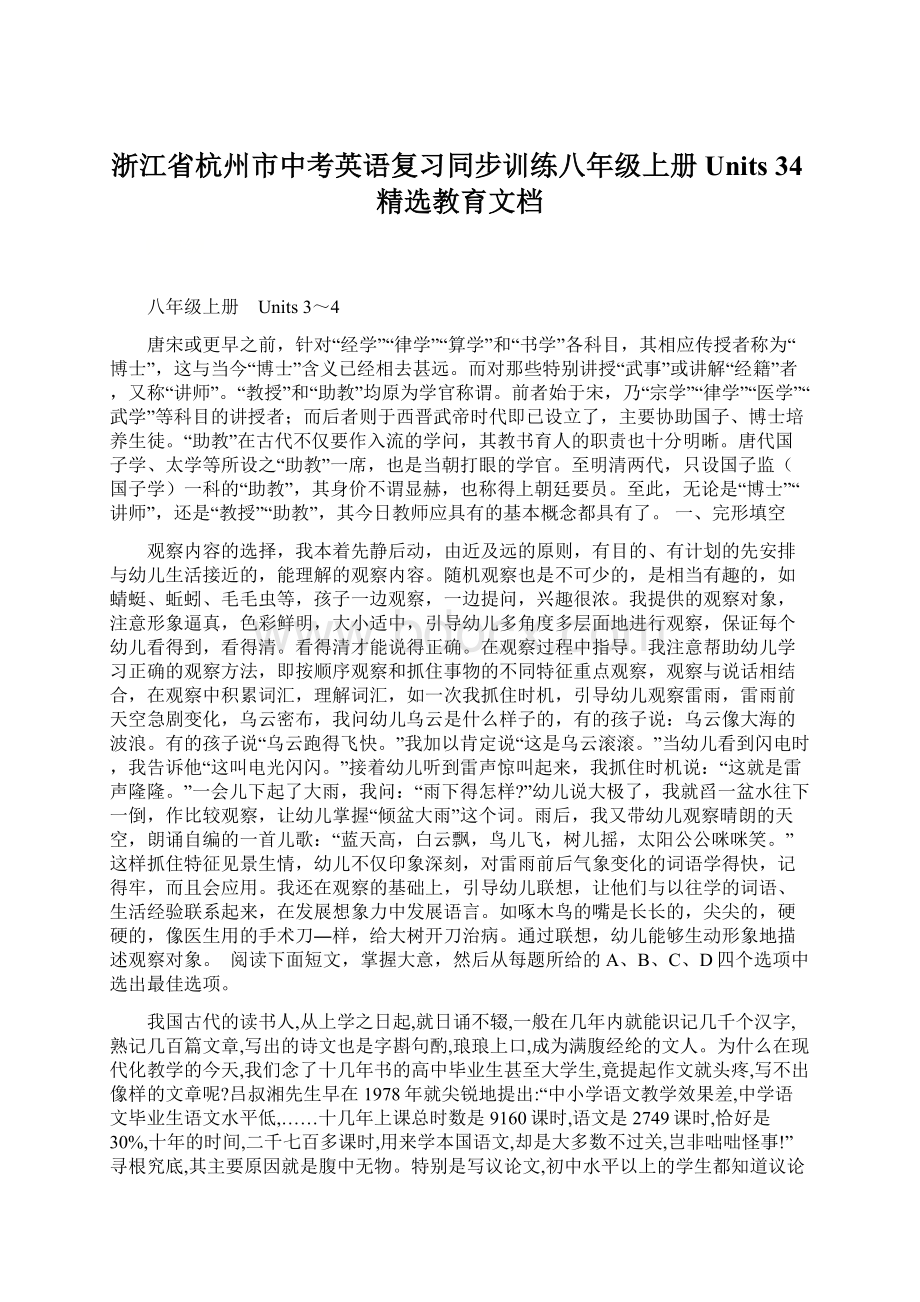浙江省杭州市中考英语复习同步训练八年级上册 Units 34精选教育文档.docx
《浙江省杭州市中考英语复习同步训练八年级上册 Units 34精选教育文档.docx》由会员分享,可在线阅读,更多相关《浙江省杭州市中考英语复习同步训练八年级上册 Units 34精选教育文档.docx(8页珍藏版)》请在冰豆网上搜索。

浙江省杭州市中考英语复习同步训练八年级上册Units34精选教育文档
八年级上册 Units3~4
唐宋或更早之前,针对“经学”“律学”“算学”和“书学”各科目,其相应传授者称为“博士”,这与当今“博士”含义已经相去甚远。
而对那些特别讲授“武事”或讲解“经籍”者,又称“讲师”。
“教授”和“助教”均原为学官称谓。
前者始于宋,乃“宗学”“律学”“医学”“武学”等科目的讲授者;而后者则于西晋武帝时代即已设立了,主要协助国子、博士培养生徒。
“助教”在古代不仅要作入流的学问,其教书育人的职责也十分明晰。
唐代国子学、太学等所设之“助教”一席,也是当朝打眼的学官。
至明清两代,只设国子监(国子学)一科的“助教”,其身价不谓显赫,也称得上朝廷要员。
至此,无论是“博士”“讲师”,还是“教授”“助教”,其今日教师应具有的基本概念都具有了。
一、完形填空
观察内容的选择,我本着先静后动,由近及远的原则,有目的、有计划的先安排与幼儿生活接近的,能理解的观察内容。
随机观察也是不可少的,是相当有趣的,如蜻蜓、蚯蚓、毛毛虫等,孩子一边观察,一边提问,兴趣很浓。
我提供的观察对象,注意形象逼真,色彩鲜明,大小适中,引导幼儿多角度多层面地进行观察,保证每个幼儿看得到,看得清。
看得清才能说得正确。
在观察过程中指导。
我注意帮助幼儿学习正确的观察方法,即按顺序观察和抓住事物的不同特征重点观察,观察与说话相结合,在观察中积累词汇,理解词汇,如一次我抓住时机,引导幼儿观察雷雨,雷雨前天空急剧变化,乌云密布,我问幼儿乌云是什么样子的,有的孩子说:
乌云像大海的波浪。
有的孩子说“乌云跑得飞快。
”我加以肯定说“这是乌云滚滚。
”当幼儿看到闪电时,我告诉他“这叫电光闪闪。
”接着幼儿听到雷声惊叫起来,我抓住时机说:
“这就是雷声隆隆。
”一会儿下起了大雨,我问:
“雨下得怎样?
”幼儿说大极了,我就舀一盆水往下一倒,作比较观察,让幼儿掌握“倾盆大雨”这个词。
雨后,我又带幼儿观察晴朗的天空,朗诵自编的一首儿歌:
“蓝天高,白云飘,鸟儿飞,树儿摇,太阳公公咪咪笑。
”这样抓住特征见景生情,幼儿不仅印象深刻,对雷雨前后气象变化的词语学得快,记得牢,而且会应用。
我还在观察的基础上,引导幼儿联想,让他们与以往学的词语、生活经验联系起来,在发展想象力中发展语言。
如啄木鸟的嘴是长长的,尖尖的,硬硬的,像医生用的手术刀―样,给大树开刀治病。
通过联想,幼儿能够生动形象地描述观察对象。
阅读下面短文,掌握大意,然后从每题所给的A、B、C、D四个选项中选出最佳选项。
我国古代的读书人,从上学之日起,就日诵不辍,一般在几年内就能识记几千个汉字,熟记几百篇文章,写出的诗文也是字斟句酌,琅琅上口,成为满腹经纶的文人。
为什么在现代化教学的今天,我们念了十几年书的高中毕业生甚至大学生,竟提起作文就头疼,写不出像样的文章呢?
吕叔湘先生早在1978年就尖锐地提出:
“中小学语文教学效果差,中学语文毕业生语文水平低,……十几年上课总时数是9160课时,语文是2749课时,恰好是30%,十年的时间,二千七百多课时,用来学本国语文,却是大多数不过关,岂非咄咄怪事!
”寻根究底,其主要原因就是腹中无物。
特别是写议论文,初中水平以上的学生都知道议论文的“三要素”是论点、论据、论证,也通晓议论文的基本结构:
提出问题――分析问题――解决问题,但真正动起笔来就犯难了。
知道“是这样”,就是讲不出“为什么”。
根本原因还是无“米”下“锅”。
于是便翻开作文集锦之类的书大段抄起来,抄人家的名言警句,抄人家的事例,不参考作文书就很难写出像样的文章。
所以,词汇贫乏、内容空洞、千篇一律便成了中学生作文的通病。
要解决这个问题,不能单在布局谋篇等写作技方面下功夫,必须认识到“死记硬背”的重要性,让学生积累足够的“米”。
(2019·浙江嘉兴中考)Ihavefivechildren,soourhouseisalwaysnoisy.
与当今“教师”一称最接近的“老师”概念,最早也要追溯至宋元时期。
金代元好问《示侄孙伯安》诗云:
“伯安入小学,颖悟非凡貌,属句有夙性,说字惊老师。
”于是看,宋元时期小学教师被称为“老师”有案可稽。
清代称主考官也为“老师”,而一般学堂里的先生则称为“教师”或“教习”。
可见,“教师”一说是比较晚的事了。
如今体会,“教师”的含义比之“老师”一说,具有资历和学识程度上较低一些的差别。
辛亥革命后,教师与其他官员一样依法令任命,故又称“教师”为“教员”。
1,Ilovegardeningandmygardenhelpsmerelax.
“教书先生”恐怕是市井百姓最为熟悉的一种称呼,从最初的门馆、私塾到晚清的学堂,“教书先生”那一行当怎么说也算是让国人景仰甚或敬畏的一种社会职业。
只是更早的“先生”概念并非源于教书,最初出现的“先生”一词也并非有传授知识那般的含义。
《孟子》中的“先生何为出此言也?
”;《论语》中的“有酒食,先生馔”;《国策》中的“先生坐,何至于此?
”等等,均指“先生”为父兄或有学问、有德行的长辈。
其实《国策》中本身就有“先生长者,有德之称”的说法。
可见“先生”之原意非真正的“教师”之意,倒是与当今“先生”的称呼更接近。
看来,“先生”之本源含义在于礼貌和尊称,并非具学问者的专称。
称“老师”为“先生”的记载,首见于《礼记?
曲礼》,有“从于先生,不越礼而与人言”,其中之“先生”意为“年长、资深之传授知识者”,与教师、老师之意基本一致。
Foralongtime,I2thegardenofpeaceandquiet.Whenthechildren
followedmeintothegarden,Iwouldexpect3tobeoutofsight.AndIwould
handouttasks.
“Here:
you4theonions,youdigtheholes,and...”Soontheywouldbe
5ortheirarmswouldbesore(酸痛的),andtheywouldleavemetomyself.
Butduringarecentspring,6Iwasworkinginthegarden,my13�year�old
son,Josiahnoticedme.He7atoolandbeganhelping.Workingasateam,we
finishedthejobinnotimeatall.I8Josiah,realizingthatI'denjoyedworking
withhim.
Thesamethinghappened—oneortwoofthe9wouldappearandjoinin
thegardeningfromtimetotime.Eachtime,Iwouldfeel10thattheworkwas
lighterbecauseoftheirhelp.
Oneday,whenIwaspickingthepeas(豌豆)andhavingataste11,Abby
sawmeandranover.Iputseveralpeasintohermouth.Shejustlovedhow12
theywere.
“Mama,Iwanttheotherstotrythemtoo.”
Suddenly,IrealisedIhadbeenwrongforlong.I'dtriedtokeepthe13of
gardeningtomyself,andherewasachildwhocouldn'twaitto14withothers.
“Sure,honey,let'spicksome.We'llmakeawonderfulsupper.”
NowIenjoyallofthegarden'sbeautieswiththechildren.Webringthe15
backhome,preparingandcookingtheproducetogether,becauseweknowthat
everythingisbetterwhenshared.
1.A.FinallyB.QuicklyC.LuckilyD.Immediately
2.A.paintedB.guardedC.refusedD.described
3.A.itB.himC.heD.them
4.A.waterB.eatC.sellD.cook
5.A.hotB.shyC.sorryD.nervous
6.A.soB.ifC.whileD.unless
7.A.waitedforB.pickedupC.pointedatD.lookedafter
8.A.hatedB.forgotC.savedD.thanked
9.A.friendsB.childrenC.visitorsD.neighbors
10.A.boredB.sillyC.afraidD.surprised
11.A.aloneB.sadlyC.togetherD.instead
12.A.safeB.tastyC.famousD.expensive
13.A.traditionB.standardC.happinessD.background
14.A.liveB.agreeC.workD.share
15.A.meatB.breadC.fruitsD.drinks
二、阅读理解
阅读下面材料,从每题所给的A、B、C、D四个选项中选出最佳选项。
(2019·浙江杭州中考)Doyouknowwhenrestaurantswereinvented?
Thefirst
restaurantswereinventedthousandsyearsago.However,theywereverydifferent
fromrestaurantstoday.
ThefirstrestaurantswereinancientGreeceandancientRome.Theserestaurants
servedfoodinlargestonebowls.Peopledidn'torderfoodfromamenu.Everyone
usedtosharethefoodfrombigbowls.Peoplebelievethattheseplaceswerevery
popularbecausemosthomesinancientGreeceandRomedidnothavekitchens.Also,peopledidn'thavetostorefoodathomeiftheyatetheirmealsattheserestaurants.
Later,restaurantsbegantoopeninChina.Intheearly1100s,morethan1million
peopleliveinthecityofHangzhou,China.Itwasaverybusycity,andpeoplehad
money.Allofthesepeoplehadtoeat.Smartcooksstartedcookingandsellingfood
alongtheImperialWay,averybigstreetinthecity.UnlikeinancientGreeceand
Rome,peopleinChinacouldchoosefoodfromamenu.Theydidn'thavetoeatthe
samefoodaseveryoneelse.
Forthenextseveralcenturies,therewererestaurantsallovertheworld.People
couldbuyfoodonthestreetoratinns—smallhotels.Theninthemiddleofthe1700s,restaurantsstartedopeninginParis.Theserestaurantsweremoresimilarto
restaurantsweknowtoday.Therewasabiggervarietyoffood,andeatinginthese
restaurantswasamoreenjoyableexperience.Inthe19thcentury,trainsmadetravel
muchfasterandsimpler.Intheend,thiskindofrestaurantbegantoappearallover
Europeandinotherpartsoftheworld.
Now,restaurantsareeverywhere.Youcanbuyavarietyofdifferentkindsof
food.Youcanhavefoodsenttoyourdoor.Butrememberitwasn'talwayslikethat.
1.Itisbelievedthatthesefirstrestaurantswerepopularbecause.
A.peoplecouldeatdifferentfood
B.thefoodtherewasverycheap
C.peoplewereverybusytocook
D.mosthomesdidn'thavekitchens
2.HowweretherestaurantsinHangzhoudifferentfromthefirstrestaurants?
A.Theyofferedmenustocustomers.
B.Theyusuallyservedthesamefood.
C.Theysoldthefoodinlargestonebowls.
D.Theypreparedfoodforallpeopleinthecity.
3.Theunderlinedpart“theserestaurants”inParagraph4means.
A.restaurantsinancientGreeceandancientRome
B.restaurantsinHangzhouintheearly1100s
C.restaurantsinParisinthemiddleofthe1700s
D.restaurantsalloverEuropeinthe19thcentury
4.Theauthorwrotethisarticleto.
A.helpustochooserestaurants
B.tellusthehistoryofrestaurants
C.encourageustoeatatrestaurants
D.showusthechangesofeatinghabits
三、词汇运用
A.用方框中所给单词的适当形式填空。
每词仅用一次,每空一词。
1.MaryandCarolarebothinmusic.
2.“Timeismoney”isoneofmyfavorite.
3.Whenyoumyage,youwillunderstandmore.
4.Theshopnearmyhomesellsclothesvery.
5.ChonghemenCinemaismuchtoourschool.Let'sgothereandwatchamovie.
B.根据短文内容和所给中文提示,在空白处写出单词的正确形式。
每空限填一词。
Mymotherisabeautifulwoman.Herdreamwastobeagoodactresswhenshe
studiedatschool.Inherclass,shewasthemost1.(有创造性的)person.In
2.(事实上),sheoftenperformedintheschoolshowsandgotmanygood
3.(奖项).Shealsoenjoyedwatchingsomeshows,4.(虽然)some
peoplethoughttheperformersmadeuptheirlives.Momsaidtheywerefuntowatch
ifwedidn'ttaketheseshowstoo5.(严肃地).
However,aftersheleftschool,Iwasborn.Shehadto6.(选择)tocome
backtoLinhaibecausemyfatherworkedforLinhaiRadioStationasa
7.(记者)atthattime.
Momisagoodmother.Shereally8.(关心)aboutmeandalwayscooks
the9.(最新鲜的)foodforme.Wehavealotofthingsincommon.Welike
10.(分享)everything.IlovemymotherandIhopetomakeherdream
cometrueoneday.
四、任务型阅读
补全短文。
根据短文内容,从短文后的A~F选项中,选出五个适当的选项补全短文。
Dependingontheunderlyingcauseofyourdissatisfaction,theremaybeseveral
waystoincreaseyourjobsatisfaction.
1.Changingyourattitudeaboutworkwon'tnecessarilyhappen
overnight.Butifyou'realerttowaysyourviewofworkbringsyoudown,youcan
improveyourjobsatisfaction.Trythesetechniques:
2.Payattentiontothemessagesyougiveyourself.Whenyoucatch
yourselfthinkingyourjobisterrible,stopthethoughtinitstracks.Putthingsin
perspective.Remember,everyoneencountersgooddaysandbaddaysonthejob.
3.“Reframing”canhelpyoufindthegoodinabadsituation.For
example,youreceivealessthanperfectperformanceappraisalandyourbosswarns
youtoimproveormovetoanotherjob.Insteadoftakingitpersonallyorlookingfor
anotherjobrightaway,lookforthesilverlining.Dependingonwhereyouwork,the
silverliningmaybeattendingcontinuingeducationclasses,workingcloselywitha
performancecoachandhavingthesatisfactionofshowingyourbossyou'recapable
ofchange.
4.Failureisoneofthegreatestlearningtools,butmanypeoplelet
failuredefeatthem.Whenyoumakeamistakeatwork,learnfromitandtryagain.
5.Gratitudecanhelpyoufocusonwhat'spositiveaboutyourjob.
Askyourself,“WhatamIgratefulforatworktoday?
”Ifit'sonlythatyou'rehaving
lunchwithatrustedco�worker,that'sOK.Butfindatleastonethingyou'regrateful
forandsavorit.
Whetheryourworkisajob,acareeroracalling,youcantakestepstorestore
meaningtoyourjob.Makethebestofdifficultworksituationsbybeingpositive.
Doingsowillhelpyoumanageyourstr